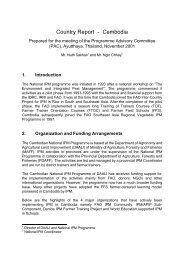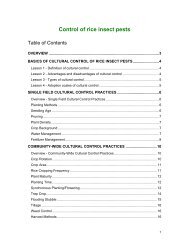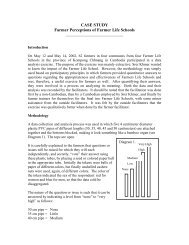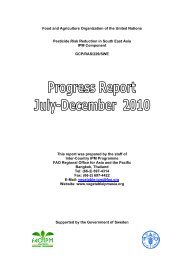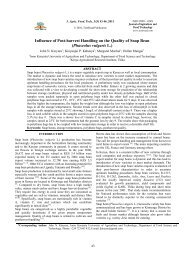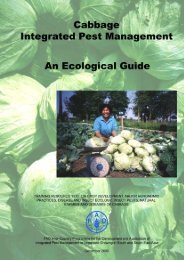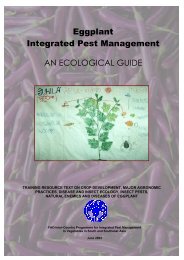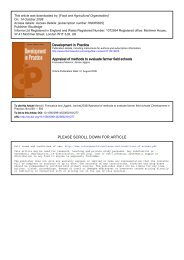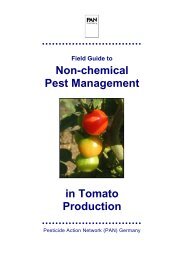VIETNAM - Vegetableipmasia.org
VIETNAM - Vegetableipmasia.org
VIETNAM - Vegetableipmasia.org
Create successful ePaper yourself
Turn your PDF publications into a flip-book with our unique Google optimized e-Paper software.
<strong>VIETNAM</strong>National IPM ProgrammeAchievements:Facts and figuresOperational since: 1992Implementing agency: Plant Protection Department, MARDPartners: ADDA, JIVC, FADO, ACIAR, CGFED, CRP, CIDSE,SEARICE, SCF-UK, Norwegian Development Fund, OxfamAmerica, Oxfam Quebec, Center for Sustainable RuralDevelopment, CARE, Action Aid Vietnam, Canadian Centre ofInternational Studies and Cooperation, Plan International,NAV, Helvetas, World Vision, Bread for the World, SNV,PVFC, NIPP, CIP, NIAER, Hanoi Agriculture University, AnGiang University, Nong Lam University, FAVRI, ProvincialGovernments, Women’s Unions, Farmers’ UnionDonors: Denmark, Norway, Australia, Netherlands, EuropeanUnion (EU), SwedenFFS conducted: 37,752Farmers trained: 1,132,654 (40% female)Trainers active: 2,546 government; (43% female)3,585 farmers(41% female)Main crops: Rice, Vegetables, Cotton, Maize, Sweet potato,Potato, Tea, Citrus, Soy beanThe Vietnam National IPM Programme has established a strong nation-wide cadre of IPM Government andFarmer Trainers in 58 provinces to strengthen and enhance the capacity of farming communities in addressingheavy reliance on chemical inputs in crop production and protection.IPM has become the standard crop protection policy and provinces have increasingly implemented and fundedFarmer Field Schools as an integral capacity building strategy in their local GAP/Safe Vegetable programmes,shifting the source of funding from external donor to own government sources.In response to concerns over domestic food safety and export trade barriers resulting from pesticide residuesexceeding MRLs, the Government of Vietnam prioritizes agricultural production quality and food safety. IPMfarmer education and Farmers Field Schools are seen as pivotal elements of such food quality and safetypromotion programmes in Vietnam.Impact studies carried out by the Hanoi Agriculture University and the Nong Lam Agriculture University from 2002to 2006 in collaboration with other institutions and <strong>org</strong>anizations, revealed the following results on theeffectiveness of IPM training for rice farmers:• reduction of pesticide sprays on an average by 38%. The percentage reduction is even higher by anaverage of 60% if only insecticide sprayings are considered. Overall, highest reductions have beenachieved in insecticides, less in fungicides and no significant change in herbicides;• reduction in application For of further nitrogen information: on an average by website 15%. In the address south (Mekong River Delta) overuse ofnitrogen has generally been significantly reduced;• reduction in seed rates by an average of 16%, and field studies (System of Rice Intensification) indicatethat there is still potential for further reductions;• reduction in total input costs on an average by 8% whilst yields have increased on average by 8%.Apart from the impact on agricultural practices and income, participation in FFS:• improves farmers' analytical skills and critical thinking capacity, both of which have long-term effects;• prepares IPM farmers to tackle local agricultural problems and devise practical solutions based onfarmer designed and implemented field experiments;• develops leadership skills so that many farmers (including female farmers) after having served as IPMtrainers in their own communities for a certain period are then selected for local leadership positions.Farmers gain a better understanding about pesticides’ impact on human health and pay more attention to safetyprecautions when handling agro-chemicals. Compared to non FFS trained farmers, IPM-FFS trained farmersreported less pesticides poisoning (exposure) related health symptoms (e.g. headache, respiratory problems orvomiting) after spraying pesticides.1
The biggest impact of IPM on the environment is the significant reduction of # of sprays and use of less toxicpesticides by IPM farmers, as confirmed by Environmental Impact Assessment (EIQ) studies. Farmers report thatpopulations of fish and shrimps in the fields have increased and natural enemy populations such as those ofspiders, lady beetles, etc. are conserved and are providing higher levels of natural biological control. Theenvironment of hamlets and fields is also cleaner resulting from less pesticide containers disposed of in fields,canals and rivers.Sustainability:Favourable changes in Vietnam's agricultural policy have improved the implementation environment for theNational IPM Programme. This includes the establishment of the Pesticide Registration Council (PRC), signing ofthe International Code of Conduct on the Distribution and Use of Pesticides (1989) and the Rotterdam Conventionon the Prior Informed Consent (PIC) Procedure for Certain Hazardous Chemicals and Pesticides in InternationalTrade (2007). Several local Instructions and GovernmentDecisions relative to strengthening the control on the use ofpesticides have been issued.Recently, the Government issued Decision No107/2008/QĐ-TTgdated 30 July 2008 on policies for development of production,processing, distribution of safe vegetable, fruit and tea to theyear 2015.MARD also has improved instructions documents facilitating andstrengthening local sustainable crop production and food safetyprogrammes. IPM principles and FFS are promoted as key toolsfor farmer training.MARD’s Decision No 84/2008/QĐ-BNN dated 28 July 2008issued the Statutes for the certification of (VietGAP) for safevegetables, fruits, and tea. MARD’s Decision 99/2008/QĐ-BNNdated 15 October 2008 issued the Statutes for management onproduction, trading of safe vegetables, fruits, and tea.Many groups of IPM FFS graduate farmers decide to <strong>org</strong>anize themselves into IPM clubs or farmer groups withvarying degrees of structure and <strong>org</strong>anization, and with a wide range of activities (such as animal husbandry,credit, marketing, etc.) depending on the needs and ambitions of the respective groups. There are currently 3,318active IPM Clubs.Innovations:Biodiversity Use and Conservation Asia Programme (BUCAP) adapted the IPM FFS approach as a research andextension methodology to promote Plant Genetic Resource Management. IPM farmers conserve and makesustainable use of local agrobiodiversity and develop new rice varieties as part of participatory communitybreeding programmes. BUCAP has been implemented in 200 communes of 13 provinces throughout Vietnamwith 5,150 rice farmers involved.The System of Rice Intensification (SRI) training, introduced as a follow up to IPM FFS, is integral in overcomingexisting rice production problems, namely, the overuse of chemical fertilizers (especially nitrogen) and lack ofgood quality seeds. High application of nitrogen and high transplanting densities are two of the major reasons forthe rice crop’s vulnerability to pests and diseases, resulting in lower yields and profits. SRI helps farmers to saveon seeds and fertilizer inputs without yield penalties. In 2008, SRI was applied on 33,306 ha in 22 northernprovinces, participated in by 96,544 farmers.Model on “Community Education on Pesticide Risk Reduction and Development of Local Safe VegetableProgramme (in compliance with VietGAP/GAP) and Market Access”. The model aims to demonstrate thepartnership between and amongst GOs, NGOs as well as local groups and networks of small holder IPM farmersto address pesticide risks and related issues together, develop their local safe vegetable production (incompliance with GAP) and facilitate market access for farmer’s products as a community.IPM alumni study alternatives to chemical pesticides, e.g., biological control such as predators and parasitoids,with assistance from IPM Trainers and researchers. The aim of the activity is to develop capacities of farmergroups as to be able to rear and mass produce alternatives to pesticides at community level for sustainable cropproduction.Through an Aus-Aid funded Project a Pomelo IPM-GAP FFS was <strong>org</strong>anized for farmers in My Hoa Commune,Binh Minh District, Vinh Long province in 2007. The FFS alumni formed “My Hoa 5 Roi Co-operative” with 26member households and covering 23,488 ha planted to Nam roi Pomelo. The Cooperative was recognized byMetro Cash and Carry Supermarket and was issued a Global GAP Certificate in 2008. In 2008, over 320 tons ofpomelo was exported to the Netherlands, Russia and Belgium through the Huyen Thoai Toan Cau Company and37 tons through Metro while 234 tons were sold to the domestic market.For further information:http://www.vegetableipmasia.<strong>org</strong>/Countries/vietnam.htm2



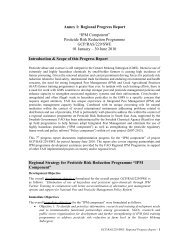
![Section 4 [ PDF file, 252 KB] - The Field Alliance](https://img.yumpu.com/51387260/1/158x260/section-4-pdf-file-252-kb-the-field-alliance.jpg?quality=85)
